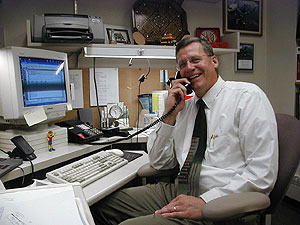|
Audio
Photos
More from MPR
Resources
Your Voice
|
Mayo expands in the Middle East
September 8, 2003
International patient numbers at the Mayo Clinic remain down two years after September 11th. Clinic officials decided one solution is to take care to the patients. By the end of 2004 a team of Mayo heart specialists will set up shop in Dubai, in the United Arab Emirates. They'll provide basic health care and screen patients for treatment in the U.S. Mayo's not the first to bring medical services overseas. Other major healthcare centers report mixed results on their attempts to export care.
Rochester, Minn. — Mayo officials decided to expand into Dubai's Healthcare City after a year and half of back and forth negotiations. The $1.8 billion initiative by the United Arab Emirates has drawn leading healthcare providers from around the world. It's all part of an effort to transform Dubai into a major medical hub.
 | |||
Steve Gudgell directs Mayo's international activities. Gudgell says Mayo's focus in Dubai will be cardiac disease, which is a leading killer in the region.
"The deaths from cardiac disease in the United Arab Emirates where Dubai is located was 29-percent last year and growing," says Gudgell. "That was an increase of over 3-percent from the previous year. So there's a need for cardiac evaluation."
Gudgell says in the past wealthy patients from the Middle East could hop on a plane and head to Rochester for consultation and treatment. Now, with growing restrictions on international travel, that's not always possible.
"The travel from the Middle East to the U.S. is difficult. One for the visa application, two for the travel. It takes 24 hours, a full day, to get here," says Gudgell. "By seeing, screening and evaluating those patients we might be able to say if we change your medications you'll probably be fine and we'll follow up in six months or so. Or 'Gosh! It sounds like you have a bad mitro-valve that should be replaced and here are your options'."
Gudgell says the clinic won't perform actual operations, at least in the short term. Instead when it's time for an invasive procedure, the patient will be directed to one of Mayo's U.S. locations.
Gudgell says Mayo's initial expansion will be modest, but there's the potential for growth.
"One cardiologist, an eco-technician and possibly a nurse will go over for a week during our school year when people are in the Middle East," explains Gudgell. "We'll start out small and see how things go. If the business plan is followed and we see growth we'll increase our activities."
Mayo won't disclose how much its investing in the new clinic or how much revenue it hopes to generate. But according to other U.S. healthcare providers, overseas expansion isn't lucrative.
Steve Thompson's the CEO of Johns Hopkins International. The Baltimore based medical institution opened a similar facility in Singapore a few years ago. It specializes in cancer treatment and research. He says the satellite clinic and research program aren't big money makers. But Thompson says that wasn't the point.
"I think its part of a general notion that U.S. healthcare organizations are seeking to reach out to other countries and other parts of the world as we realize its more difficult for them to come here," says Thompson.
For example Thompson says many patients from the Middle East that used to be seen in Baltimore, now get cancer treatment in Singapore.
Cancer research was a major draw for Johns Hopkins. Thompson says the time in Singapore has been spent researching specific cancers that only appear in Asians. He says the same research would be extremely difficult to conduct in U.S. laboratory.
The government in Singapore foots the bill for the research. And Johns Hopkins employees work side by side with scientists trained in Singapore. Johns Hopkins helps to finance the clinic, but also uses a mixture of staff from the U.S. and Singapore.
Thompson says initially the arrangement was challenging.
"People were a little, I would say, reluctant, or suspicious to look at us as an entity that was actually going to help," says Thompson.
Thompson says patients and doctors in Singapore now accept U.S. medical professionals and their practices but its taken time.
Even so its unlikely Johns Hopkins will open another clinical or research facility abroad. Thompson predicts instead specialists from Baltimore will be dispatched temporarily as consultants in other countries.
Another American medical center that's ventured abroad is the University of Pittsburgh. It opened a transplant center in Palermo, Sicily, back in the late 1990s. Surgeon John Fung directs Pittsburgh's transplant division and oversees the clinic in Italy. He says it's challenging to maintain an international program for an extended period of time.
"Those tend to work out in the early phase when there's a lot of enthusiasm to get American physicians to go over and actually train other physicians or actually set up a mini-American hospital but the challenge is to continue with that," says Thompson.
He says the arrangement takes a toll on the personal lives on U.S. physicians who are shuttling back and forth. Another hurdle is ongoing communication.
"I think a major challenge even with our Italian program is continued dialogue between hospitals overseas with the mother ship back home," says Fung.
Fung says Pittsburgh's relationship with the transplant center in Italy has evolved. Pittsburgh now manages the facility, importing the latest medical breakthroughs. Fung says the arrangement will continue through the foreseeable future and this winter the center will move into a new 88 bed hospital.
Fung says the eyes of the U.S. medical community will be on the Mayo Clinic as it prepares to move abroad. He says he's seen satellite clinics come and go. In the post-September 11th world, Fung says, it will be important to see if Mayo can gain a lasting foothold.
|
News Headlines
|
Related Subjects
|

